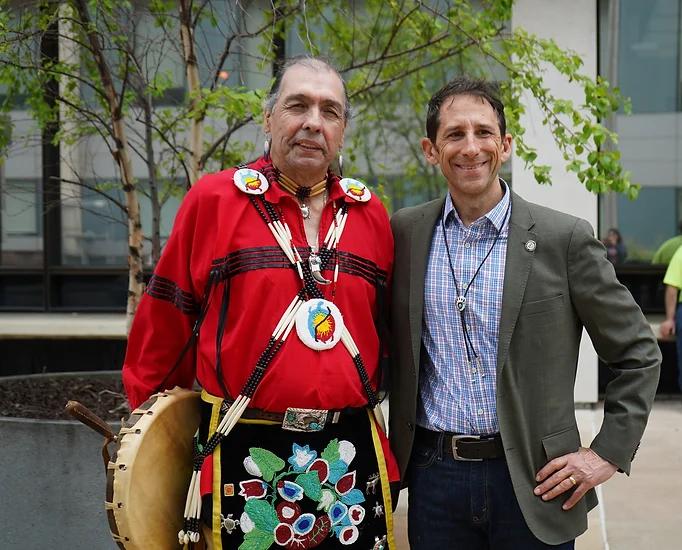Muhlenberg held a land acknowledgement discussion on Oct. 7 in the Seegers Union Event Space. Faculty, staff and students had the opportunity to hear about indigenous displacement and the role of land acknowledgements with representatives from Delaware Nation. The three speakers were Katelyn Lucas, Daniel Strongwalker Thomas and Logan Johnson. These speakers use the terms Delaware and Lenape interchangeably. They use the term representative to refer to someone who is part of an indigenous tribe. Representative Thomas’ parents were chiefs and played a large community service role. Representative Johnson is a travel citizen of Delaware/Lenape nation. Lucas is a Delaware Nation Historic Preservation Assistant who works at the Museum of Indian Culture in Allentown. This land acknowledgement was put together by Anthropology Department Chair Ben Carter, Ph.D, Assistant Professor of History Jacqueline Antonovich, Ph.D, and students Danielle Siteman ‘23 and Aya Kanan ‘23.
During the discussion, Lucas stated that “Land acknowledgments exist in a variety of formats. Each tribe has different formats. They can be formal statements given before a public event, sometimes in written forms, but they all should acknowledge and respect the land we’re standing on. [Land acknowledgments] should prioritize the living relationship between their [Native Americans] homelands and their ancestors.” In addition, Lucas pointed out that “Land acknowledgments should not be purely historical, and it should acknowledge that settler displacement is ongoing. Federal tribal nations should try to maintain their relationships with their homelands.” Lucas also explained that Muhlenberg students are currently living on Lenapehoking, which is translated to “homelands of the Lenape.” Lucas ended her portion of the discussion by highlighting that Delaware Nation is a federally recognized nation and that Delaware nation does not recognize non-federally recognized groups as issues of citizenship and sovereignty.
Thomas talked about how the Lenape people were forcibly removed from Lenapehoking and currently live in Oklahoma. Thomas said that “[I] came back on behalf of my nation. There was a community process and I needed to work hard to get an audience in this area.” He also said that he was “grateful for Allentown’s mayor to allow representatives from Delaware Nation to come back to Lenapehoking for a land acknowledgment discussion.” Thomas stressed that “for the last three generations we have looked back and dared to dream to come back to [our] homelands.”
“[I] came back on behalf of my nation. There was a community process and I needed to work hard to get an audience in this area.”
Thomas also called attention to the fact that indigenous displacement “is not a race or color issue, being a Native American is not a race. American Indian is not a race. My citizen status is Lenape, it comes from my political recognition through my sovereign nation.” Johnson agreed with Thomas’s points and addressed the audience by asking: “What can land acknowledgments do from here to be effective? What am I learning historically and culturally from your own community’s culture? What are you doing to help your community at large?”
Siteman said, “Back in the summer of 2021, I started doing research with doctors Carter and Antonovich to start the process of writing a land acknowledgement at the request of President Harring. We quickly realized that we needed to do a lot more background research into who the Lenape are today and their history before writing a land acknowledgement which could come off as performative if not done correctly. The project turned into a multi-semester project that is still ongoing. Our goal with the land acknowledgement discussion is to educate students, faculty and administrators about the Lenape today as well as the role land acknowledgements may or may not play in higher education institutions.”
Carter emphasized that, “There are Muhlenberg courses that discuss Indigenous Peoples of the U.S. such as Dr. Antonovich’s class ‘The American West’ and Dr. Corbin’s ‘Native American Literature & Film,’ but there are very limited courses that specifically address the Delaware/Lenape.” Siteman and Carter stated that “We’re hoping to continue this research, and we’re definitely looking for more researchers for this project. We also want to screen a documentary called “The Water Gap: Return to the Homeland,” which showcases the journey of Lenape youth as they travel back to their ancestral homeland to connect with their Lenape identity.”
An anonymous Muhlenberg student who attended the Land Acknowledgement discussion said that “I am thankful to be a part of the conversation to acknowledge the land stolen from the Lenape tribe and grateful that this conversation is reaching audiences at colleges in Pennsylvania such as Muhlenberg… [Siteman and Carter] want to make these Land Acknowledgement discussions more ongoing, but it’s really hard to know what the next phase is.”






















